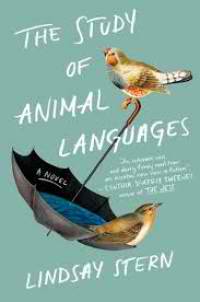The Study of Animal Languages by Lindsay Stern
 Wednesday, August 21, 2019 at 7:25AM
Wednesday, August 21, 2019 at 7:25AM 
Published by Viking on February 19, 2019
The Study of Animal Languages is a domestic drama. In most respects, it follows the conventions of a domestic drama. A couple grows apart. Infidelity is suspected. The husband is likely having a midlife crisis and must come to terms with the causes of his unhappiness. Nothing in this novel surprises, other than quality of the writing, which saves the novel from being a novelized Lifetime movie.
Ivan Link’s wife Prue has completed a study of animal communication that suggests birdsongs may be a form of language. Ivan is a philosophy professor. He studies epistemology, the gap between data and truth. He doesn’t think Prue’s study proves anything. He may be right about that, but academic research can advance understanding even if it fails to produce a startling breakthrough. Since Ivan presumably understands that, his complaints about his wife’s research must stem from something other than a belief that birdsongs are not a language.
The reader will quickly suspect that Ivan is jealous of Prue. She is likable and thus well liked in the academic community while Ivan, who is pedantic and self-isolating, is treated more as a respected colleague than a friend. Cracks are forming in their marriage, including disagreements about fellowships and foreign travel (Prue has opportunities; Ivan likes to stay at home) and stress caused by Frank, Prue’s bipolar father.
The conflict between Ivan and Prue begins to reach a climax when Prue presents a paper that includes a fascinating discussion of the barriers to proving that sounds are part of a language when the listener has no way to assign meaning to the sounds. During her presentation, Prue asks how scientists can consider the emotional responses of voles to be sufficiently akin to human responses to use voles for biomedical research, while at the same time terrorizing them to determine how they respond to terror. I am not a particular friend of voles but the question merits serious consideration. Ivan, however, thinks Prue is a fool to question the ethics of animal research in a presentation to an audience that consists largely of animal researchers. The opportunity to gain tenure, Ivan believes, depends in large part on not pissing off faculty members who might end up on a tenure committee. Yet Ivan later proves that he can be just as career–destructive as his wife. His midlife meltdown is classic.
At other points, the novel’s focus is on Frank and on the differing efforts that Ivan and Prue make to cope with his dementia. Frank believes that sharks in an aquarium are speaking to him, conveying feelings rather than words. The story draws parallels between animal suffering, which animals are unable to articulate with words because they have no human vocabulary, and Frank’s suffering, which he is unable to articulate in a way that others understand because of his mental illness.
Ultimately, the plot makes its way to the well-trampled ground of marital infidelity, or at least to suspicion that it might be occurring. Joyless sex, odd telephone calls, a new acquisition that might have been a gift from an admirer, and absences from home are all clues, but do they justify the conclusion that hanky–panky is afoot? And if the suspicion is correct (or even if it is not), what is the correct response? Confrontation? Retaliation? Maintaining the unhappy status quo for fear that change will be worse?
Throw Ivan’s impressive meltdown into the mix and you have the familiar ingredients of a domestic drama. Despite its familiar subject matter, the story’s background details and observant prose set The Study of Animal Languages apart from other novels that dissect marriages. The novel offers a focused examination of two people on a collision course and the choice they must make about their respective (or joint) futures.
The depiction of the unbalanced Ivan at midlife is a bit over-the-top, particularly when contrasted with the blameless Prue. While Prue purports to share responsibility for the wall that has arisen between them, it is clear that all the fault all rests with Ivan. I suspect that shared fault is more typical, but I can't condemn a novel for depicting an atypical marriage.
Since Ivan is a philosopher, the reader should expect a bit of philosophy. The novel’s big lesson is that life is not about figuring out what really matters (unless you're a philosopher), but “figuring out that your life was never even about you to begin with. You’re not the hero. You’re just someone in the cast.” That is a lesson everyone should learn.
RECOMMENDED